I followed Maoist chairman Prachanda’s election campaign trail in Kathmandu-10 election constituency last week for a few days. I watched him addressing a few small gatherings of his supporters and general public that was either sympathetic to the party or undecided about whom to vote. Only a few were critical of the Maoist party. After addressing a mass meeting in his constituency Prachanda also went to see the families of two former PLA guerillas who were disappeared during the insurgency. In front of the house of one of the disappeared guerilla, the chairman addressed a small gathering of a few dozen people for a few minutes. Here is the story:
By Dinesh Wagle
Wagle Street Journal
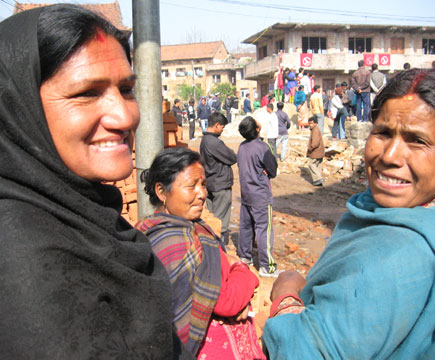
Ratnamaya Shrestha, 46, (left) listened to the Prachanda speech standing about two hundred meters away from where Prachanda was speaking (in Kot Ghar, Thankot). The housewife, a registered voter from the area, said: “He talked about making a new city. But here we have scarcity of cooking gas. We have problem with load shedding. Here is scarcity of daily consumption materials. He didn’t talk about this.”
Kot Ghar, Thankot (Friday 7th March): As soon as he got off the SUV with dark windshield on the main road Comrade Prachanda received vermilion powder and garlands from his supporters who were waiting for him to appear in the constituency (Kathmandu-10’s Thankot area). As Prachanda walked towards the mass meeting venue, Kot Ghar a cultural center of the neighborhood where animals are scarified during the largest Hindu festival Dashain and other festivities are organized, two men continuously played the traditional Newari musical instruments. It was about nine in the morning.
While four members of People’s Liberation Army walked on both sides of Prachanda a team of eight policemen from the Armed Police Force formed a circle around the leader. Members of Young Communist League were keeping general people on the street from coming too close to the leader. Receiving garlands and vermilion powder, he reached the stage where the emcee welcomed him with this note: “The victory march of towards the republic of the liberated people has begun. The new voyage that will to go through Kirtipur to Chhaimale (two places of the Kathmandu-10 constituency from where Prachanda is standing for the CA elections) has begun.”
…………
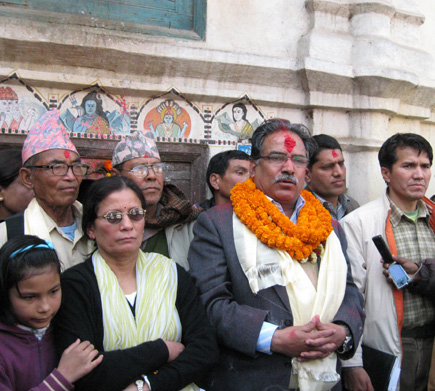
After the Kot Ghar, Thankot speech was over, Prachanda drove a few minutes to see the family of two of the disappeared members of the Peoples’ Liberation Army. Kedar Shretha, father of Sachindra who disappeared during the insurgency, said: “[Prachanda inquired about our family. He said he was emotional about the disappearance of my son. He talked about my son’s contribution in the Peoples’ War.” Standing just in front of the gate of the house, Prachanda addressed (above) a small spontaneous gathering of the neighborhood that was there to see the face of the leader who led a violent movement. “Comrades Nischal (another disappeared PLA guerilla) and Suchindra are staying inside our eyes and hearts. This election is about thousands of martyrs and those who were disappeared.” The lady standing on Prachanda’s right is Sita, his wife. The kid is their daughter who was also present in another mass meeting the next day. The little girl was seated in a chair along with her mother. At one point, she went to the lap of her father. After seeing her engaged with herself and making facial expression etc, apparently not affected by the activities of mass meeting, a foreign correspondent commented: “She is bored out of her mind.” Later on, I joked: “She might revote against her father for the boredom!”
The Prachanda verbatim: While standing before you today I remember that day some 250 years ago when Prithvi Narayan Shah had come here before attacking Kathmandu valley. He launched the campaign to establish a centralized and unitary nation state where one language and one caste rules.
Today we are here to see the fall of the 250 year old unitary centralized state. That old state has crumbled and only the cremation has remained to be performed.
People can interpret my candidacy from here and Rolpa-2 in their own varied ways. But this is not a normal coincidence. This is not a normal election. This is the climax of the process of changing an era. My candidacy has symbolic importance. We started the great People’s War from Rolpa and one of the last qualitative attacks of the War was bravely conducted here in Thankot (Police Post). You people heartily welcomed that action (Thankto attack). That attack reaffirmed the historical role of Thankot. Thankot played the role in the old state and for the new state as well. As the gateway of the Valley, Thankot was used by the Shah king as a point from where he made plans to attack the valley. We used Thankot as our last attack incident to end the Bahunist feudal state that is dominated by one language and one group.
I have an emotional and ideological relationship with Rolpa. In Thankot, we have had the last hit of the People’s War. Thankot also played a role to bridge war and peace. It bridged the Peoples’ War to the Peoples’ Movement [of April 2006].
Economic revolution is necessary to make the political revolution complete. Economic revolution depends on political revolution.
Nepal is not a poor country. It has plenty of natural resources. Nepali people can labor hard. The only problem with Nepal until now is that the political leadership lacked willpower, plans and honesty.
The railway line from Lhasa should be brought to Kathmandu. That should be extended to Pokhara and Lumbini.
India and China are having intense economic growth. We must take advantage of that.
This is not my personal candidacy. Thankot can become an important place in our campaign to make a New Nepal. A new city could be developed in an organized way from Thankot to Dackchhinkali (another village of the Kathmandu-10 constituency).
………
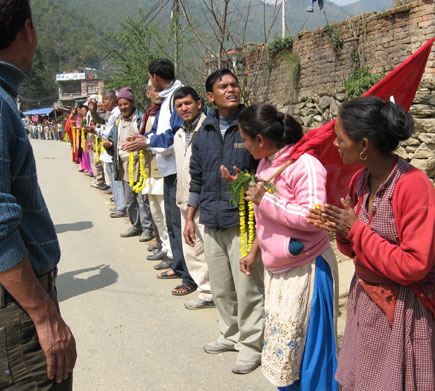
After the Kot Ghar (Thankot) speech, Prachanda went to address a mass meeting in Pharping. He stopped for launch in a restaurant where a long queue of people welcomed him with garlands and vermilion powder.
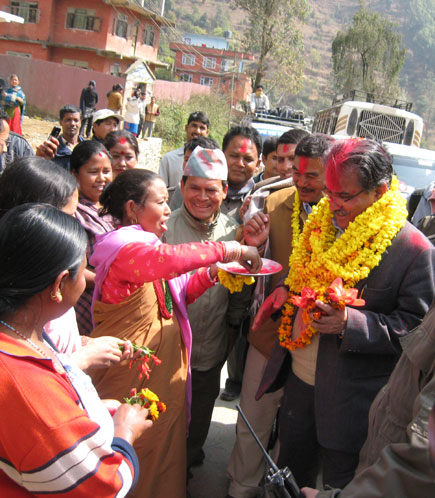
When Prachanda stopped for launch in a restaurant in Pharping before addressing a mass meeting a long queue of people welcomed him with garlands and vermilion powder (above). One of the people standing in the queue was Achyut Karki, 55 (below). I talked to him while Prachanda was about 30 meters away receiving flowers from others. “Someone told me that some leaders are coming here,” he said. He didn’t know who was coming.

Ratnamaya Shrestha, 46, listened to the 25-minutes long speech standing about two hundred meters away from where Prachanda was speaking. The housewife and a registered voter from the area talked to me after the speech was over:
“It’s good to see him speaking and giving speech,” said the woman. “He talked about making a new city. But here we have scarcity of cooking gas. We have problem with load shedding. Here is scarcity of daily consumption materials. He didn’t talk about this. That’s our problem these days. If that gets solved, the country would be better.”
Ratnamaya said she hasn’t made up her mind as to whom to vote in the election though she said she planned to vote. “I need to hear more from him before deciding to vote him,” she said about Prachanda.
………….
After the speech was over, Prachanda drove a few minutes to see the family of two of the disappeared members of the Peoples’ Liberation Army. Kedar Shretha, father of Suchindra who disappeared during the insurgency, said: “[Prachanda inquired about our family. He said he was emotional about the disappearance of my son. He talked about my son’s contribution in the Peoples’ War.”
Standing just in front of the gate of Kedar’s house, Prachanda addressed a small spontaneous gathering of the neighborhood that was there to see the face of the leader who led a violent movement.
“Comrades Nischal (another disappeared PLA guerilla) and Suchindra are staying inside our eyes and hearts. This election is about thousands of martyrs and those who were disappeared. The big issue of the election is whether martyrs and disappeared will win or agents of status quo.
“I am not the one who is speaking this at the gate of the house of Suchindra. He is speaking.”
………

Maoist affiliated local water resource utilization organization organized a program in Matatirtha village to talk about the water management. That was only an excuse, the program was all about election and campaign for the Maoist party. Prachanda attended and spoke at the show that was entertained by comedian Manoj Gajurel. Prominent medical doctor Arun Sayami endorsed Prachanda as the first future president of Nepal.
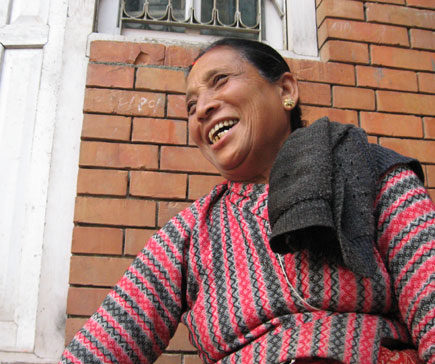
Purna Kumari Maharjan, 60, a housewife who never went to a school, was sitting at the courtyard of her house that was attached to the public ground where other people gathered to listen to Prachanda. The resident of Na Gaun in Kirtipur said that she hasn’t decided whom to vote: “Whoever the good people comes to ask for my vote, I will give to him.”
As Prachanda was walking towards his car, I asked him how he felt while entering the home of one of the disappeared and talking to the families. He replied: “My heart becomes sensational.”
After that Prachanda went to take part in a rally in Pharping. He stopped for launch in a restaurant where a long queue of people welcomed him with garlands and vermilion powder. One of the people standing in the queue was Achyut Karki, 55. I talked to him while Prachanda was about 30 meters away receiving flowers from others.
Why are you here today?
“Someone told me that some leaders are coming here.”
Who are those leaders?
“No idea. I don’t know.”
He gave the flower to Prachanda and shook his hands. He didn’t talk to Prachanda. A registered voter from Dullu of Sheshnarayan VDC, he said he hasn’t decided as to whom to cast the vote. He said he hoped that the election will bring justice to all people in the village.
……………………
Nah Gaun in Kirtipur (Monday, 10th March): Prachanda addressed a small town-hall type meeting kind of gathering on Monday (10 March) evening in a neighborhood called Nah Gaun in Kirtipur (his constituency). Most of the participants in the gathering were housewives and men who had returned to their home from their day job in the city. The courtyard of the neighborhood was decorated with white flags printed in red color the election symbol of the Maoist party: the hammer and sickle inside a circle. The courtyard traditionally sees public and cultural functions of the neighborhood including community poojas and jatras. A banner hung just above the stage read in Newari language: Sahalaha Mujya (Consultation meeting of the neighborhood).
Many of the participants were seated on the sukul, a mat made up of hay.
Purna Kumari Maharjan, 60, a housewife who never went to a school, was sitting at the courtyard of her house that was attached to the public ground where other people gathered to listen to Prachanda. She said: “Prachanda is coming here.”
Have you decided whom to vote in the election?
“No. Whoever the good people comes to ask for my vote, I will give to him. Whoever promises me cheaper price, drinking water. I will not give vote to those who hike the price.”
Have you seen Prachanda before?
“No, never. That’s why I am sitting here to listen to him.”
Whom will you give you vote?
“I will decide that at the time of voting. Now whoever comes here to ask my vote, I will just say yes to him and that’s it, finished! I don’t tell anyone I will not vote you. I tell all of them I will vote you. But I can vote to only one and that I will decide at the time of voting.”
…………
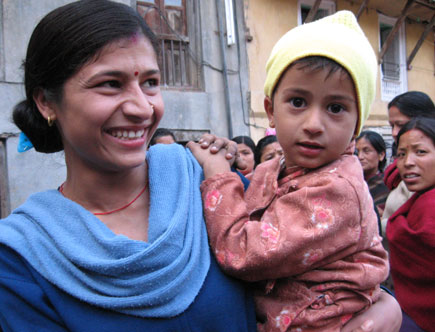
28-year-old Manju Poudel is originally from Gorkha where Maoist second in command Dr. Baburam Bhattarai is standing for the CA elections. She is not registered to vote at Na Gaun but when she heard Prachanda was coming in the neighborhood, while she was filling a bucket in a public tap, she hurriedly filled that and rushed to the venue. “I came to see Prachanda,” she said. “I was filling my bucket in the tap. Someone screamed Prachanda is coming. Then I ran toward here.”
…………
28-year-old Manju Poudel is originally from Gorkha where, among others, Maoist second in command Dr. Baburam Bhattarai is standing for the CA elections. She is not registered to vote at Na Gaun but when she heard Prachanda was coming in the neighborhood while she was filling a bucket in a public tap she hurriedly filled that and rushed to the venue. “I came to see Prachanda,” she said. “I was filling my bucket in the tap. Someone screamed Prachanda is coming. Then I ran toward here.”
The lady was carrying her five year old son and her husband was standing next to her as she talked to me:
“I am very much curious to see him. I heard a lot about him before. Many people talk about him. When I saw him a while ago, I found him just like we normal people.”
“I think he will win,” she said. “I can’t vote from here. I have to go to my home. I think I will go to home for the election and also meet my relatives there. This is the first time we are having this type of election in Nepal.”
Prachanda came at the venue and went inside a home on the other end of the courtyard to take some rest. He also ate. According to a PLA soldier who was eating beaten rice and meat, Prachanda also ate the same. While the leader was inside, a curious crowd was instantly formed outside the building and they talked about the leader.
“I have seen him on TV,” one of them, Sarita Maharjan, 42, a housewife, said. She added: “I want to see him and listen to him speech today. I am curious to know what he has to say.”
…………..
Sanjb Maharjan, 33, works at a hotel in Kathmandu. He is from the same neighborhood and was waiting for Prachanda to speak. “In this election we should select the good person rather than sticking to a certain party and voting by the party line,” he told me. “Nepal is stepping towards 21st century and we need to elect one who leads us in that direction effectively. In previous elections, we used to vote on party line, but this is a different election.”
“I am neutral as of now,” Sanjib continued. “I feel Maoists are to be credited for bringing the country this far. They have given the impression that they have vision. Other parties lack that.”
What about all the bloodshed that we saw in the past decade? Aren’t Maoist responsible for all that?
“If you want to change, you have to go through some suffering. If you are cleaning a toilet, you will have to go through the bad smell. We also wanted to have change and we went through difficult times.”
Now the program was about to begin. The emcee introduced Prachanda:
“Let us welcome the first future president of a republic Nepal and the leader who can pose a direct challenge the imperialist America. Comrade Prachanda is among us; let’s welcome him with a huge round of applause.”
Male and female participants were in equal number and many of them were seated cross-legged on the mat while others stood at the back.
Clad in a light blue tracksuit was Raju, one of the 25 YCL members, who were maintaining order at the meeting. PLA soldiers tried to control the eager participants who were struggling to go near to Prachanda. Prachanda’s wife Sita was seated right next to the leader on the dais. Some people were continuously taking photos of Prachanda from their cell phones. A poet from the neighborhood recited a poem that was dedicated to the leader and talked about him achievements so far.
As one of the Maoist leaders from the area was speaking in Newari, a woman commented: Prachanda can’t speak Newari, how can he communicate with the people here?
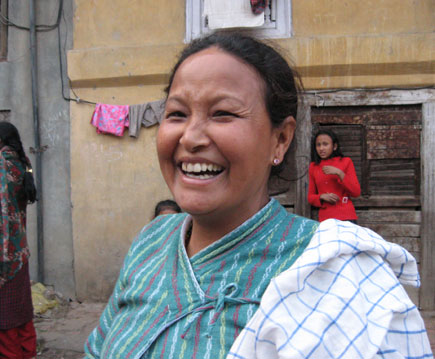
“I have seen him on TV,” Sarita Maharjan (up and below), 42, a housewife, said. She added, “I want to see him and listen to him speech today. I am curious to know what he has to say.”

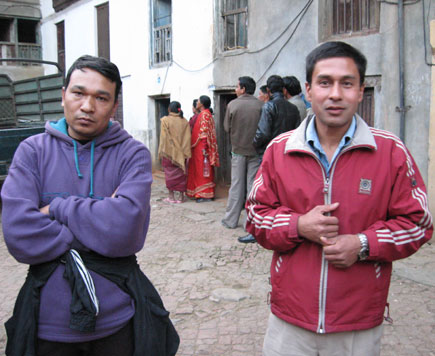
Sanjb Maharjan, 33, (right) works at a hotel in Kathmandu. He is from Na Gaun neighborhood if Kirtipur and was waiting for Prachanda to speak. “I am neutral as of now. I feel Maoists are to be credited for bringing the country this far. They have given the impression that they have vision. Other parties lack that.”
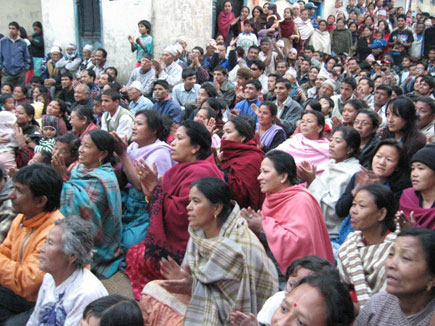
Prachanda addressed a small town-hall meeting kind of gathering on Monday (10 March) evening in a neighborhood called Nah Gaun in Kirtipur (his constituency). Most of the participants in the gathering were housewives and men who had returned to their home from their day job in the city. Many of the participants were seated on the sukul, a mat made up of hay.
Prachanda, in Nepali, said: “We have seen many elections since 1950. Many parties won and many lost. Many leaders won and many lost. But people of Nepal never won. None of those elections made people of Nepal victorious. The people and the nation should have won.”
“People are still fighting against feudalism. They are not victorious as yet in a real sense.
“Those who talked about CA, republic were branded terrorist until a couple of years ago and were ordered to be killed. And those who ordered for the killing are now suddenly talking about the CA and republic as if these words belonged to them. Now these very people who ordered the people who talked about CA and republic to be killed are now claiming that they brought the issue of CA and republic. They are behaving as if Maoists came out of nowhere.”
There was a huge round of clapping as soon as Prachanda said that. “Right,” a woman commented to Prachanda’s statement. “That was a good dialogue,” a girl standing next to me commented and the woman nodded.
“Those who tried to abort CA,” Prachanda continued, “are trying to loot the CA from people. The CA has come after the sacrifice of the sons and daughters of Nepali people. Only the mother can raise her child. Our party is the mother of the CA and only we can take care of CA properly.”
“I am not feeling like the election is here. For me the election hasn’t come. This is the continuity of our battle. I am not feeling like asking votes, but am worried about loosing this battle.
“I am not standing here as an individual. Martyrs are standing here and I am representing them. I am standing on behalf of them to warn the people.
“This is an uncompleted movement and we must complete it on the side of the people via CA.
“This is the time for parties to get united. Unity is the necessity of the day. All patriots, nationalists, and those who favor change must come together. This is not a usual parliamentary election that comes every five years. This is a historical opportunity. This is a great movement to make a New Nepal. Yesterday we tried to find UML leaders for four hours as it was the last day to form an alliance. But the senior leaders of the UML were not available. They had different excuses. The UML leaders say they don’t want us to win in Kathmandu. The Americans also don’t want to see us here in Nepal. What’s different between the UML and the Americans who bomb daily in Iraq and Afghanistan and kill innocent people? I think UML leaders are under the pressure of America and Delhi not to form an alliance with us. If you are functioning under the signals of foreigners, there will be a huge accident in the country.
“We are confident that we can raise the income of Nepali people up to 3 thousands dollars in ten years. We have to expand rail line from Lahsa to Kathmandu and Pokhara and Lumbini and we have to expand rail network in Madhes (Terai). We did the magic in 10 years, the political magic. That is why the country is at the doorstep of the CA. Our party can do another magic, economic magic. This historical opportunity must be organized in our party’s favor to make that magic happen. You have seen what we did in the past.”
………………
After the Prachanda speech was over, I asked Manju Poudel, the lady with her child, about her impression. “He talked about building a new Nepal,” she said. “I don’t know if that is possible. We will have to see that.”
Do you think they will go back to jungle if they loose election?
“No, I don’t think they will go back to jungle.”
What do you want from this election?
“All kinds of facilities and employment. We are all unemployed.”

Comments
38 responses to “The Campaign Trail: Following Prachanda in Kathmandu-10”
Glamorous message of hope, and happy housewives who needs school in general?
Reality is in my house gas bottles are being stolen as well as bicycles, and there is no money because the taxi was in an accident. Telephone also stolen. Kuleswor heart of the real kathmandu villagers.
Project a bright future for Mr Nepal and associates, I like the train idea, but not to Pokhara keep it apart as it was one of my few nice memories in crazycountry.
Jungle is everywhere, as well as the Pureland. Nepal is a great country for Tibetans and foreigners, but who really is nepalese? And what about the little babies sniffing glue lying there half dead in New Road?
Low caste? Karma? Collective nasty karma looking conveniently the other way.
again same sort of jingo hogwash to fool innocent people.
” We wll buikld new Nepal”
“We will make income of 3000 dollars” – why not talk in rupees terms?
Like Americans in Iraq blah blah – what’s that got top do with us at this moment?
We’ve heard it all and again the HOW is missing – give a PLAN not a speech.
Everyone says they want to do this that and the other – HOW?
We know we have natural resources – how do we benefit from it – potential is always there – where is the PLAN?
Yes the rupie is going up.
Nepali people are waiting to cast vote for reformation and development of country.
Massmurderer Puspa Kamal Dahal and his leutenant Baburam :
you two will be fixed before 10 April, 2008.
Brahmin TTTBR Pushpa Kamal and Brahmin ceremonial Baburam have given enough lip service to ending fuedelism in Nepal– their own practice, on the contrary, has to been to reinforce feudelism– this seen by the kind of leaders they have selected for each region that represents different castes and groups– most of them are still headed by brhamins, similalry, nepotism within maoist party is rampant– Baburam’s wife, her sister, Puspa Kamal’s daughter, his uncle, and wives, sons and daughters of other party leaders have directly received party tickets or are in the proportionate list or are enjoying a key position in the MInistries– this is exactly what TTTBR and Baburam talk against in their speeches but their deeds are no different. And of course, theior terrorist guerillas are still terrorising all parts of Nepal. And so called loktantric TTTBR talks about continuing his revolution if he loses the elections. We need to come our in large numberrs oand show this terrorist that he belongs to the jungle.
The problem with Nepal is that there is absolutely no one that loves this country anymore. It is and will be divided among these ruthless immoral politician criminals who claim that are liberators are glorified with media such as this website. Sad demise for a nation that was torn and now will be a part of india.
Madhesis must understand that pahadis are insecure. Madhesis must not align with India but rather should show their nationalism towards nepal unless of course they want to be second class bihari citizens in India. They need to chose a new nepal with new hopes over their political alignment towards New Delhi who will make madhes another Bhutan.
Maoists are a bunch of hooligans with no political values nor education. Blaming foreign powers for their failures and royalists for their unpopularity is what these criminals are going to do all the time. I am perplexed as to how a democratic election is going to be held when Maoists combatants have returned from their camps into villages. How is this election going to be fair, the smart polticians who are in disguise members of YCL in this blog please enlighten me. The whole election is a drama and it will never represent the true voices of the Nepali people. It will represent the voice of the gun held by criminals who will dictate the villagers.
I hope this election fails and fails miserably because it is impossible that it will be fair and no one has the guts to make it fair for it will mean mobilizing the army but then again that maybe a royal conspiracy ???
where is news about unrest in tibet? NY times and BBC are reporting 80 people dead.
K ho yo nepali media ma pani yesto self censhorship?
this pracanda or girija or makuney or yadav r all the same n talking same nosense story all the time
hey Dinesh Ji,
This is the fantastic coverage of a significant man’s one day jounal. i see your effort in putting us exact details. i really enjoyed reading about Prachanda and people and audacity of hopes in people. Hope to read such in comming days too.
I think Dinesh Wagle is the best blogger and reporter in the country. After reading this detail, i came to conclude this.
And also finally got it why Prachanda chose Thankot and Rolpa!! For first and last of their attacks!!!!!
wow,
what a way to chose a constituency. Noithing to do with the future. All to do with personal signs and significance. Only a maoist would get the point. the people are still wondering what was it (killings) all for?
hi dinesh-ji,
nice idea just to tell what the people are telling and thinking without much unnecessarily judging their comments!
Great!
about the election campaign of prachanda dinesh wagle reporting makes any person jealous about his patience and hard working.ya he is a real blogger and journalist
Another bold way doing prachaar n prasar!!!!-
-“Maoist affiliated local water resource utilization organization organized a program in Matatirtha village to talk about the water management. That was only an excuse, the program was all about election and campaign for the Maoist party.”
Further, in his speech-
” While standing before you today I remember that day some 250 years ago when Prithvi Narayan Shah had come here before attacking Kathmandu valley. He launched the campaign to establish a centralized and unitary nation state where one language and one caste rules.
Today we are here to see the fall of the 250 year old unitary centralized state. That old state has crumbled and only the cremation has remained to be performed.”
Yo sunda ta jhan kasto kasto lagchha..- as if they r really on the verge of doing sth drastically different!!!!!
anyways,
thanx to the BLOGGER!!
Traditionally role of the press is asking unpleasant questions and raising problems, being societys WATCHDOG
Now all is dandy and wonderful and fine.
So dig up dead bodies and ask them if they are royalist or what, but respect families.
Prithivi Narayan Shah came to Thankot in 250 years back to unite and built the Nepal as a nation, but Prachanda came to unite with Girija and Madhav in thankot to destroy and divide the nation and put the whole sovereignity in the hand of India.
Another things, Prachanda had mentioned that he will take per capita income of Nepal upto USD 3000 after 10 years. Does he know that for this our GDP growth should be 27 ( at present GDP of India is 8 and China is 10 and Nepal is negative after spam takeover of the govt. ) . He had talked lots about railway routs and hydropower development without even minimum home work just to fool the poor and uneducated people.
Now look at all the tibetans abroad forever….
Diaspora should unite with reasonable forces and not give lip service to Chinas puppets.
No Olympics
freedom of thought worldwide.
What a bunch of rubbish this election talk is! It’s the principle of communist and socialist parties to sell dreams. I’d have been happier and willing to vote for the Maoist if Dahal had said his party will work toward increasing employment, industry, provide electricity, gas and water.
He knows Nepalis, rich and poor, educated and uneducated, learned and ignorant are all GULLIBLE.
Will this heal the wounds that he has done in the people hearts and minds. Still they (maoists) have not fullfilled the agreements made during the peace process. still there are ppl in the village and rural areas whose house and land have not been returned to the respective owners. just coming in media wearing flower malas and red abir will not help to improve their public figures. more has to be done and more efforts has to be put up.
Samyam ji, thanks for the info that maoists had choosen Thankot and Rolpa as their last and the first attacks.
Actually ther first attack was Dang, the last Thankot with SPA information and Indian funding.
It’s funny how people forget –
Magdi bombing is a non issue these days.
Nepalis can forgive which is good BUT to forget means we don’t give a shite – and that does not say much about us.
It’s a shame. Maybe throw in the towel and sing Jana Gana Mana – atleast there are people who do give two tosses about that.
It’s a shame. Maybe throw in the towel and sing Jana Gana Mana – atleast there are people who do give two tosses about that.
why did you remove my Magdi bombing comment?
It is saddening to see the Maoist hypocrisy on the rise. Nepali media. Kantipur has terribly failed to take on the Maoist’s double standards. It is unfortunate that a single powerful publication owes a lot in guiding the general consciousness of the public especially in times of these politically volatile and risky transitions. And what have we seen? Maoist’s bargaining power grow day by day. Where were the Kantipur heroes who took on Gyanendra’s regime in April movement?
Maoist’s are a third largest party in by a big popular margin. That’s why we are beginning to see political intimidations and rhetoric of “peaceful war if Maoist does not win” from yes, Prachanda and co.
Well, i’m confused is it really the ppl’s will to line up like that to welcome mr. pushpa kamal dahal or were they all forced to line up like that? were the ppl listening to his speech really interested or more than half of them being carried out from other places in passanger busses?
It will backfire
No one likes maoists more than police actually .
?
ha ha ha… i don’t think that this is a political article keeping in mind the constitutional elections or is it?
😉
PRACHANDA is noun or adjective?
I just read in their parcha (…. lai prachanda bahumatle bijaya garaun!)
If this election takes place fairly Mr. Puspa Kamal Dahal (aka ex-Terrorist and future president hopeful Prachanda) is never going to win.
His revolutionary promises is going to divide the country and is never going help built a “new” Nepal. The maoist conflict was never needed and is not going to change anything in this country. The maoist manifesto promises things such as employment, health care and education for everyone which is not achievable by Nepal.
So Dear Nepali bhai, dai, didi, bhaini haru .. .. Maobadi lai yo chunab jitna nadeu… If terrorists win this election there will be a rise of new-talibal in nepal.
THIS IS BETTER JOURNALISM AND ACCURATE ANALSYSIS than waht we get from this Maoist run blog site.
Thanks to Maila Baje.
If any departed soul tenaciously hovers over Nepal today, it is surely that of King Mahendra. Despite the major political parties’ sustained campaign since 1990 to officially erase his memory, the late monarch stubbornly refuses to go away.
Allegations continue to be heaped on him some 36 years after his death. From prime minister to peon, almost everyone seems to have one tale or another to add to this collective denigration. Since the royals themselves have chosen to endure this onslaught of opprobrium, few “royalists” have risen in public defense of the man who did more than anyone to define our Nepaliness. Yet his legacy speaks for itself.
King Mahendra was no democrat, and he probably would have resented any such characterization. Not because he discounted the universality of the human quest for freedom. Nor because he questioned the commitment of its Nepali advocates. He simply didn’t believe in political parties’ ability to steer Nepal through the tumult of his times.
And tumultuous his times were. The founder of the modern Nepali state, King Prithvi Narayan Shah, described his new kingdom as a yam between boulders to the north and south. By King Mahendra’s time, two massifs had formed on the east and west, capturing all the chilliness of the Cold War. Democracy, after all, had become a distraction for far too many countries in Asia, Africa and Latin America.
Geopolitics was only part of King Mahendra’s story. The defining element was his personality. A virtual prisoner under the Ranas as crown prince, he had ample time to ruminate on the kind of realm he wanted. What he saw outside the Rana-induced confines was not pretty.
With the onset of the 1950s, the United States saw events forcing it to take a diplomatic interest throughout Asia on a scale without precedent. “Nepal Is Example of Area Where We Now Take Active Role,” The New York Times said in a sub-headline one February morning.
That was a period, one must recall, when New Delhi’s “hopeful neutrality” in the East-West ideological conflict was considered in Washington and London as a prelude to the triumph of communism in India and beyond.
The prospect of China’s absorption of Tibet precipitated the 1950 Treaty between the Rana regime and Prime Minister Jawaharlal Nehru’s government. That didn’t go far enough amid the full-fledged Chinese invasion of Tibet. King Tribhuvan’s flight to New Delhi came as the next move on the geopolitical chessboard.
“[T]he unseating of the king to make way for his grandson is exciting general wonder,” The Washington Post reflected in an editorial. The real anxiety came in the next sentence: “Are the Chinese Communists preparing the way for an assault on India when Tibet has been subjugated?”
During their months in exile in India, King Tribhuvan and Crown Prince Mahendra would often find themselves conversing in Newari. Surely, it wasn’t their intention to impress their hosts with their linguistic dexterity. They wanted to keep their interpretation of the goings-on to themselves as far as possible.
Warranted Discretion
Their discretion was warranted. During this period, Washington and London had come closest to recognizing infant King Gyanendra. The death of Sardar Ballabh Bhai Patel, Indian home minister and purported advocate of Nepal’s formal incorporation into the Indian union, changed the dynamics. Returning with King Tribhuvan, the crown prince found himself officiating regularly for his father.
Long before B.P. Koirala could recognize Nehru’s real motives in forging the Delhi Compromise, Crown Prince Mahendra had made up his mind. He was not about to trade the Ranas for a group of foreign captors. Over the next four years, he became increasingly explicit in his disenchantment with the divisiveness democracy had wrought. Such fissures, in his view, could only exacerbate the balancing act his ancestor’s yam parable encapsulated.
By the time King Mahendra ascended to the throne in 1955, the Nepali Congress, like other parties, had lost little time in political pandering. The party had already hailed a letter from Crown Prince Mahendra supporting its demands for the early election of a constituent assembly and an independent judiciary as the equivalent of the Magna Carta.
King Mahendra may have foisted multiparty elections to parliament in place of one to a constituent assembly his father had promised. But could he have really succeeded in “gifting” a constitution without the acquiescence of B.P. Koirala and other leaders of the democracy movement?
Amid the Nepali Congress’ landslide victory in 1959, B.P. felt he could finally claim the premiership in full democratic style. If King Mahendra wasn’t comfortable about inviting B.P. to head the new government, the Nepali Congress leader wasn’t about to relent, either. B.P. sought – successfully – Nehru’s intervention and, as premier, began making thinly veiled references to the anachronism called the monarchy.
Royal wrath wasn’t the real reason for the brevity of Nepal’s democratic politics. Over the 1950s, Nepal came under greater pressure from the north, south, east and west. As B.P. readied for talks with visiting Chinese premier Chou En-lai, the monarch was preparing for a joint address to the United States Congress.
The American media was hungry for color. “[The] shy, slender little King in dark glasses, has caught Washington’s fancy,” The New York Times gushed. The Washington Post chimed in: “[D]ressed in a blend of East and West with a brown, doublebreasted suitcoat over an exotic Indian costume, [King Mahendra] told the National Press Club … there is practically no culture left without some Western influence.”
Quadrangular Contest
Back home, weeks after Chou’s visit, Prime Minister Koirala informed parliament that Chinese troops had killed a Nepali officer and captured 16 unarmed soldiers operating on the frontier with Tibet. China, which had initially expressed surprise at B.P.’s announcement, subsequently acknowledged the attack and apologized. Yet it would be a while before the Chinese pulled back their troops from the frontier. By this time, the Soviets had arrived in Nepal to join a quadrangular contest for influence.
Brazen as it may sound, if not King Mahendra, then Prime Minister Koirala would have had to terminate Nepal’s democratic experience. Simply put, there were too many fault lines flustering the increasingly assertive external players.
The first two years of the royal takeover were increasingly precarious. The banned Nepali Congress made an abortive attempt at regicide, while stepping up an insurgency from exile. To the casual observer, Nepal’s northward drift seemed strange, given the stark ideological incongruity. For the kingdom, it was part of – to borrow the title of a book by a prominent American scholar – a strategy for survival.
On a visit to India, shortly after returning from China, King Mahendra denied Nepal had ever tried to play off India and China against each other. A Chinese proposal for a confederation of Himalayan states — including Nepal, Sikkim, Bhutan, the Northeast Frontier area and Nagaland, and possibly Tibet – was clearly aimed for India.
After India’s defeat in the border war with China in 1962, a chastened Nehru sought to engage with the palace. He forced the Nepali Congress to suspend its anti-palace insurgency. Still, it wasn’t hard to miss Delhi’s seething resentments. Nepal had turned a corner. Panchayat, as the new polity was enshrined in the 1962 constitution, was just the name for the geopolitical equilibrium the kingdom had attained.
As some foreign observers saw a growing rivalry between Peking and Moscow for the favor of Nepal, others were amused by what Time magazine called King Mahendra’s “wheeling and dealing in style.” One afternoon, a correspondent noted, the monarch attended the formal inauguration of a ropeway, only hours after Nepali and Chinese officials signed an agreement by which Peking would build two warehouses and a brick-and-tile factory.
The next day, the king and queen boarded a Soviet helicopter, flown by the Russian crew, to Paanchkhal to inspect a 70-mile road being built by Chinese engineers from Kathmandu to Kodari. Back in the capital, the magazine went on, Mahendra heard reports on negotiations with the Soviet Union for a sugar mill, cigarette factory and hydroelectric plant.
‘Neutral Cockpit’
While beatniks of the world were gravitating to Nepal, western diplomats were speaking of how King Mahendra had adroitly turned Nepal into a highly profitable “neutral cockpit”. The Indians, for their part, continued peddling the line that Chinese aid to Nepal was nothing more than grandstanding. They claimed, among other things, that abandoned projects were still listed in ‘active’ stage for propaganda purposes. Others saw Peking to be in good position to take over control of Nepal if a political upheaval threatened the personal rule of King Mahendra.
U.S. Vice President Spiro Agnew arrived in Kathmandu in 1970 on 22-hour visit. “The crows cawed a welcome, the sacred cows were herded off the road to avoid a confrontation with the motorcade,” according to one chronicler. Clearly, those who saw Nepal struggling to emerge into the modern-day world under a system reminiscent of the Middle Ages were influenced more by its quaintness than its exclusiveness.
Conventional wisdom seeks to undercut King Mahendra’s legacy by citing the 1965 arms memorandum with India as well as the Kalapani dispute. As to the first, the Indians have benefited from Nepali unawareness. The Panchayat government, rejecting India’s interpretation, revoked the memo in 1969 when it ordered the Indian military mission to leave Nepal.
The fact that the Kalapani dispute stemmed from India’s insistence on holding on to the strategically vital territory for defensive purposes after the 1962 war with China remains a footnote in the debate. For some reason, Narayanhity Palace has clung on to documents that could have shown how King Mahendra had regularly raised the issue during meetings with Indian leaders.
On the way to the airport from what would be his last meeting with the Indian premier, King Mahendra conceded that the dispute had dragged on for too long. He told an aide that he had exhausted what he considered his “quota of irritants” for that particular year.
Wheeling and dealing in style? It is perhaps no coincidence that the period between 1965 and 1969 saw Nepal aggressively raising its international profile. The royal regime’s success in inviting the United Nations in the development of Lumbini as well as in becoming a non-permanent member of the U.N. Security Council did much to establish the kingdom’s independent identity. India, grudgingly, now started listening to Nepal’s grievances on the sidelines of international summits.
To be sure, Craven A cigarettes, Chivas Regal bottles and Patek Philippe watches continued to bring out the full regalia of what had become Nepal’s unchallenged political leader. Yet King Mahendra continued reaching out to the rural hinterland, encouraging ordinary people to speak up.
He extended the same privileges to his critics. Today we remember Ram Raja Prasad Singh, the doyen of Nepali republicanism, as a firebrand agitator who sought the abolition of the monarchy as a member of the Rastriya Panchayat. What Singh won’t tell us is the content of his discussions with King Mahendra at the palace, where he was whisked into from prison in the stealth of night.
We can make an educated guess, though. King Mahendra wooed leading communists to the new regime by describing himself as one of their own, albeit with a crown. The Rayamajhis, Regmis, Adhikaries and Upadhyayas may have used that to justify their own crossover. That ultimate revolutionary, Chairman Mao, didn’t need such prodding. Geopolitics, more than anything else, led the Chinese communists to consider the monarchy their principal ally in Nepal.
Akin to an amateur soothsayer, King Mahendra could size up his interlocutors and stun them with fairly accurate assessments. Some still look back and recall his remarkable accuracy in predicting the future as well. Yet the monarch was down-to-earth when it came to real life. Governing Nepal, he would say, consisted of shuffling around 200 people.
To the uninitiated, that may have sounded like undiluted braggadocio. But the king certainly didn’t consider himself omnipotent. Having received no formal education, the monarch would not hesitate to profess his ignorance of the intricacies of economics. Yet he was constantly on the lookout for talent.
During a visit to the United States, a young Nepali Ph.D. student instantly impressed him. Amid the hectic royal schedule, the palace secretary misspelled the first name of this individual. Later, in announcing the man’s appointment as the top economist in the government, Radio Nepal broadcast the wrong first name. The man in question – the youngest person ever to head a government ministry – went on to serve his nation with great distinction under two subsequent monarchs.
During another foreign trip, one Nepali pointed out a mild rebuke of the monarch that had appeared in the morning newspaper. King Mahendra was brutally candid. He didn’t have the power, in a foreign land, to haul the reporter in prison.
‘That’s The Way It Is…’
From attending wrestling matches to searching for Chihuahua puppies to take back home, King Mahendra made full use of his visits to the United States. So much so that, in 1967, CBS anchor Walter Cronkite wondered, in his customary that’s-the-way-it-is evening news sign-off, why his president should be lavishing such importance on the king of a country few Americans had heard of.
In 1968, B.P. Koirala and his associates were freed from prison under a deal with King Mahendra. The monarch had suffered a heart attack and B.P., too, was ailing in detention. If there had been any power-sharing proviso, B.P.’s subsequent decision to go into exile and harden his posture against the monarchy shut that door.
As King Mahendra was transiting in Bombay following medical checkup in Britain, B.P. happened to be in the city. In a gesture of reconciliation, the ex-premier stood in the airport receiving line. After a brief awkward moment that approximated a royal snub, King Mahendra returned to acknowledge B.P.’s greetings.
The ex-premier had little luck in scheduling a meeting with the monarch at his hotel suite. Yet he remained mystified by the monarch’s affability at the airport. It was almost as if the tumult of the sixties had never occurred.
Earlier, during another trip abroad, King Mahendra had stunned a few Nepalis by claiming that he thought B.P. was the only person qualified to be premier. One asked, with palpable diffidence, why the monarch had imprisoned Nepal’s only democratically elected prime minister.
King Mahendra said it would be wrong to blame him alone for B.P. personal and political torment. The questioner was too flabbergasted to volunteer a follow-up inquiry. (A careful reading of B.P.’s prison reminiscences also suggests that there was much between the teacup and the lips.)
India’s military intervention in East Pakistan, leading to the creation of Bangladesh in 1971, evidently emboldened the Nepali Congress to harden its posture vis-à-vis the monarchy. King Mahendra, for his part, had been planning reforms that would have led to a restoration of multiparty politics.
The monarch had asked Shambu Prasad Gyawali, a former law minister, to draft the necessary constitutional changes. Gyawali reached the royal bungalow at Chitwan with his recommendations on the appointed morning in January 1972, only to learn that King Mahendra had died of a massive heart attack a few hours earlier.
Confronting Contradictions
An early and central feature of Nepal’s road to newness has been the renaming of state institutions bearing royal prefixes. Yet the facts are what they are. The monarchy’s leadership of the army will remain at the center of the history of modern Nepal’s emergence.
The renaming of the Royal Nepal Airlines and the Royal Nepal Academy cannot obscure the fact that both institutions were created under the monarchy as part of its campaign to consolidate Nepal’s independent identity. The removal of the royal portrait from banknotes cannot change that key piece of monetary history: It was under King Mahendra that the rupee began its rise as the national currency under a fully fledged central bank.
The Nepali mind must confront the contradictions this partisan change has brought about. Prithvi Narayan Shah’s campaign of national unification is now depicted as a war of aggression. Nepalis, we are told, have never really been united emotionally. Yet even the semblance of an attack on Nepaliness – Hrithik Roshan, anyone? – provokes a fiery response. The country, moreover, rejoices in the triumph of an Indian Idol contestant simply because he happens to be a Nepali speaker sharing a familiar surname.
With Nepal under growing siege from within and outside, even the worst critics of King Mahendra must find it difficult deep down to revile the man for what he really stood for.
The prachanda’s election campaign with his image projected as future president is suicidal.
The president should come from janjatis like newar gurungs magars tharus etc They are the people who built the nation with blood and sweat
Prachanda cultivated the politics based on race and caste to draw the sympathy of minorities.To some extent he has been succesful but opening the wide possibility of further racial violence. He doesnot care about it his dreans will be fulfilled by being a president
This is the revival of Maoists style of bahunbad.This is the trail of Prachanda becoming a puspa kamal baje
What is the use of replacing Gyanendra?: Replacing one bahunbad by anotherReplacing one dictator by another?
To pacify the situation Prachanda if U are not stupid enough declare that U will not aspire to become president
Declare that it is turn of janjatis not Bahuin chhetris and Thakutis as U HAVE BEEN TELLING IT
Thanks
Hello Matribhumi,
I read everything you wrote about King Mahendra….
Wow…I loved it…
I don’t care what the rest of the world says…
But I still think that Monarchy has great importance even in this 21st century
My family every time say that I am killing my time here at
net, except I know I am getting experience daily by reading such nice articles.
Wow, fantastic weblog structure! How lengthy have you ever
been running a blog for? you make running a blog glance easy.
The whole glance of your web site is fantastic, as well as
the content!